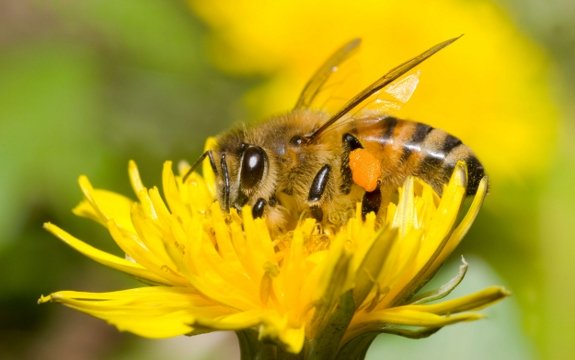List of Foods We Will Lose if We Don’t Save the Bees

Many pesticides have been found to cause grave danger to our bees, and with the recent colony collapses in Oregon, it’s time to take a hard look at what we would be missing without bee pollination.
In just the last ten years, over 40% of the bee colonies in the US have suffered Colony Collapse Disorder (CCD). Bees either become so disoriented they can’t find their way back to their hives and die away from home, or fly back poison-drunk and die at the foot of their queen.
There are many arguments as to what is causing CCD, but the most logical and likely culprit is the increased usage of pesticides by the likes of Monsanto and others.
A study by the European Food Safety Authority (EFSA) has labeled one pesticide, called clothianidin, as completely unacceptable for use, and banned it from use entirely.
Meanwhile, the U.S. uses the same pesticide on more than a third of its crops – nearly 143 million acres. Two more pesticides linked to bee death are imidacloprid, and thiamethoxam. These are also used extensively in the US, while elsewhere, they have been taken out of circulation.
Recently, the FDA also seized Terrence Ingram’s bees, a naturalist who had been studying bees for over 30 years, and had a colony that was resistant to Monsanto’s Roundup. Ingram’s prized hives, along with their queens, were destroyed by the FDA, and Ingram was given no warning that his bees would be demolished.
List of Crop Plants Pollinated by Bees
While we don’t need bees to pollinate every single crop, here is just a brief list of some of the foods we would lose if all our bees continue to perish:
- Apples
- Mangos
- Rambutan
- Kiwi Fruit
- Plums
- Peaches
- Nectarines
- Guava
- Rose Hips
- Pomegranites
- Pears
- Black and Red Currants
- Alfalfa
- Okra
- Strawberries
- Onions
- Cashews
- Cactus
- Prickly Pear
- Apricots
- Allspice
- Avocados
- Passion Fruit
- Lima Beans
- Kidney Beans
- Adzuki Beans
- Green Beans
- Orchid Plants
- Custard Apples
- Cherries
- Celery
- Coffee
- Walnut
- Cotton
- Lychee
- Flax
- Acerola – used in Vitamin C supplements
- Macadamia Nuts
- Sunflower Oil
- Goa beans
- Lemons
- Buckwheat
- Figs
- Fennel
- Limes
- Quince
- Carrots
- Persimmons
- Palm Oil
- Loquat
- Durian
- Cucumber
- Hazelnut
- Cantaloupe
- Tangelos
- Coriander
- Caraway
- Chestnut
- Watermelon
- Star Apples
- Coconut
- Tangerines
- Boysenberries
- Starfruit
- Brazil Nuts
- Beets
- Mustard Seed
- Rapeseed
- Broccoli
- Cauliflower
- Cabbage
- Brussels Sprouts
- Bok Choy (Chinese Cabbage)
- Turnips
- Congo Beans
- Sword beans
- Chili peppers, red peppers, bell peppers, green peppers
- Papaya
- Safflower
- Sesame
- Eggplant
- Raspberries
- Elderberries
- Blackberries
- Clover
- Tamarind
- Cocoa
- Black Eyed Peas
- Vanilla
- Cranberries
- Tomatoes
- Grapes
If one of your favorites is on this list, you should consider becoming a bee activist.
Additional Sources:

Interesting… So if Mr. Ingram had hives resistant to pecticides, would this correlate to higher production of honey and contamination from the GMO crops??? This would be a primary reason that Monsanto and friends would want his valuable hives.
Although, It they were resistant…. I for one would not want to eat that honey.
This country needs to ban GMO crops PERIOD.
And the people who want a LABEL on GMO had better wise up to the fact that in a matter of years, even your little LABEL on organic produce will be contaminated by GMO and the insects and bees that have mastered the art of survival of the fittest.
Screw saving the bees! They sting! Also, I don’t care for fruit that much
I am doing all that I can…but my philosophy is always…’let it fall where it may’…if we have no power to change it. It is what it is…and I refuse to ‘pray’ about it..etc… I’m a doer…so show me what to do..and I will do it…but if we are talking about lobbyists…that are pushing the pesticides..that kill our beloved bees…well, where are the fruit growers in all this???? Where is their lobby..for what is right and moral..and making sure we have what we need to survive as a species???? When will you, Mike Adams report on that??? You’ve got all the negative here..but where is the other side?? or is this all your public is wishing to read…death and destruction issues????
Amazing how people comment without actually having read the article.
We have a number of friends who raise bees. There is nothing quite
like natural, local honey for a wide variety of reasons and health
concerns. Domestic bees are a remarkable resource that we would
be lost without. Thanks for a sobering wake-up call. No matter how
big or small, we all need to do our part to solve the problems…
An apple a day keeps the doctor away! Keep the bees….keep nature at its best. Ban the toxic pesticides and gmo’s. Growers, stand up and be counted….we want organic produce at reasonable prices. Thank you.
If 95% of all pollinating insects are killed off or reduced dramatically probably most of the plant life on earth would die off as well.
We had honeybees everywhere when I was a little
boy. Now, they are rarely seen!
We won’t lose anything tho, Monsanto will sell genetically modified non-reproducing seed.